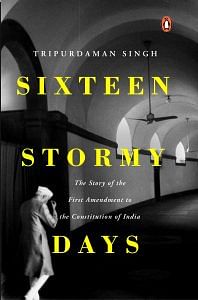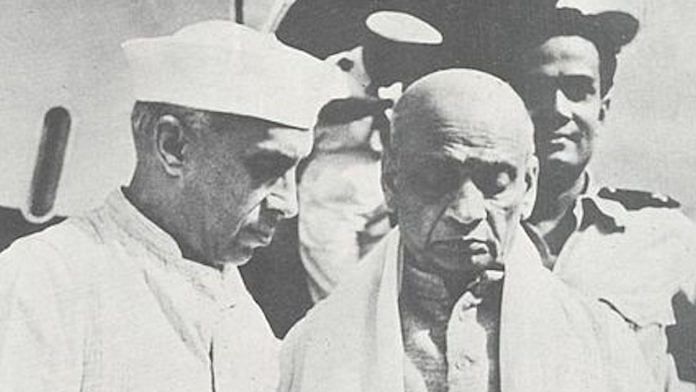Meanwhile in Delhi, as March rolled into April, communal strife in Bengal continued to occupy much of the distressed prime minister’s attention, as it would do over the first half of 1950. He [Jawaharlal Nehru] was particularly irritated by Sardar Patel’s private insistence on a ‘well-considered, firm and determined’ approach vis-à-vis Bengal and Pakistan during cabinet meetings and parleys with MPs, an attitude he believed was providing cover for those who wanted a clash with Pakistan—not least his critics in the RSS and the Hindu Mahasabha. Hectored by his opponents, pilloried by the press and seemingly undermined by his deputy, Nehru felt besieged from all sides. Not content with the censorship orders against the Organiser and the other steps the home ministry had taken to control the situation, he berated the home minister:
I think we have taken up far too lenient an attitude towards those in India who encourage this communal feeling of hatred and violence. The Hindu Mahasabha talks about Akhand Bharat, which is a direct incentive to conflict . . . The belief that retaliation is a suitable method to deal with Pakistan, or what happens in Pakistan, is growing. That is the surest way to ruin for India and Pakistan.
Patel, who on this matter had self-confessedly submitted to Nehru’s approach despite his own misgivings, was taken aback. ‘Our action has been circumscribed only by the provisions of the law as interpreted by our legal advisors and the High Courts,’ he responded. ‘We put thousands in jail and adopted a policy of release only after we were continuously attacked on the score of maintaining civil liberties.’ He pointedly and icily reminded the prime minister:
We are now faced with a Constitution which guarantees fundamental rights—right of association, right of free movement, free expression and personal liberty—which further circumscribe the action we can take. That means that for every executive action there must be legal justification. If within these limits you feel that our policy towards communal organizations has been lenient, steps can certainly be taken in the manner you may suggest.
Coming from Nehru’s oldest and closest colleague, a man known to be forthright and unequivocal, the insinuation was stark and damning. Did Patel believe Nehru to be unaware of constitutional limits on executive power? Or did he consider the prime minister to be willing to discard them if they impeded his will? There is no certain answer. Whether he privately suspected him of not respecting constitutional boundaries will have to remain a matter for debate and conjecture. The impression that Patel was chiding his leader for trying to circumvent constitutional constraints and disregard fundamental rights is, however, impossible to escape. Astute politician that he was, Patel clearly had insights into Nehru’s thinking, insights which informed the advice he gave the prime minister. He may have been no champion of personal freedom—once even going to the extent of branding the Constitution’s fundamental rights provisions a result of ‘idealistic exuberance’—but the home minister was plainly wary of trifling with the Constitution.
Just what Nehru had in mind, or was prepared to countenance, we may never completely know. But Patel’s sardonic attempt to educate his leader on the essential foundations of the constitutional order could only imply one thing: that the prime minister was irked by constitutional restraints and willing to disregard them in pursuit of his political goals. With its wry tone, its allusions to extra-constitutional action, and its derisive presumption of Nehru’s ignorance of even the most basic tenets of constitutional legality, Patel’s acerbic reply provided the earliest indication that all was not well between the prime minister and the Constitution to which he had recently pledged allegiance.
Also read: Why Mandela failed & Gandhi-Nehru succeeded in bringing about revolutionary constitutionalism
Nehru himself gave an inkling of his opinions on the subject a few weeks later while replying to Pakistani complaints about the West Bengal press when he tried to reassure the Pakistani government that every effort was being made to rein the fourth estate in. ‘I entirely agree with you that some of the newspapers in West Bengal still continue to write in a way which I consider undesirable,’ he confessed to Pakistani foreign minister Zafarullah Khan, ‘ . . . [But we] have to face the difficulty that in view of our new Constitution, the courts do not approve of many kinds of action that used to be taken previously against the press.’
It was an ominous confession, demonstrating his impatience with constitutional constraints and seemingly confirming Patel’s private suspicions. How Nehru would face this difficulty, only time would tell. In the middle of this sparring over free speech and constitutional limits on executive action, as the government chafed at restrictions on its power and faced action in the Supreme Court, zamindari abolition and land reform legislation was introduced in the Uttar Pradesh and Bihar legislative assemblies, setting the stage for a titanic clash between the state and landed magnates.
 This excerpt from Sixteen Stormy Days: The Story of the First Amendment to the Constitution of India by Tripurdaman Singh has been published with permission from Penguin Random House India.
This excerpt from Sixteen Stormy Days: The Story of the First Amendment to the Constitution of India by Tripurdaman Singh has been published with permission from Penguin Random House India.
Hardback | Rs. 599 | 288pp




It is a premature conclusion.
If the excerpt is anything to go by, the book is a farrago of insinuation, suggestion and manipulation of what the record actually shows.
પટેલ સાહેબ આર એસ એસ ને સ્ટ્રોંગ રીતે બેન્ડ કરી દેવા ની ભલામણ કરેલી .
નેહરુ ગાંધી પરિવાર ને લોકો લિબડો (લિબરલ) કહે છે. નેહરુજી ની ભૂલ હતી કે સરદાર સાહેબની સલાહ માની નહોતી.
Resident writer of BJP. Might become governor of a State soon.
It is interesting that so far this facet of Nehru was never revealed by any of his autobiographers or anyone else. Also, this shows once again that Sardar should have been the PM rather than Nehru as Sardar was certainly more far sighted, statesmanlike and mature. So do we conclude that authoritarian streak runs in the Nehru-Indira family?!